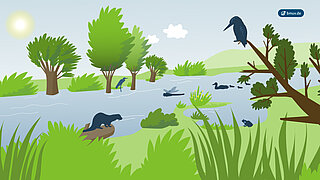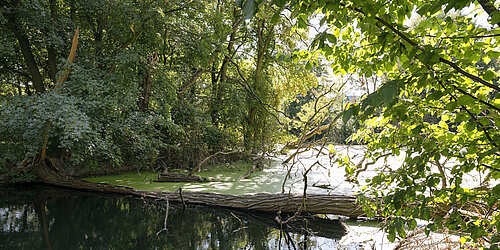Near-natural water balance
The Federal Action Plan on Nature-based Solutions for Climate and Biodiversity (ANK) provides funding to strengthen the near-natural water balance in Germany. This includes restoring rivers, lakes and floodplains, as well as increasing water retention in the landscape. The Centre of Competence for Nature-based Climate Action (KNK) provides information about suitable funding programmes and offers technical advice.
Water is the foundation of effective nature-based climate action: when moors, forests and soils dry out, they lose their ability to store carbon. In the face of increasingly extreme drought periods and heavy rainfall events, an intact water balance and the ability of landscapes to store and release water are more important than ever.
Intact and diverse rivers and lakes have a major impact on biodiversity. Together with their floodplains, watercourses provide habitats for many plant and animal species. Floodplains also filter surface water and retain it in the landscape. As natural retention areas, they are essential for preventive flood protection. In urban areas, rivers and lakes form part of the “blue infrastructure”, supporting evaporation and local cooling, and improving air circulation, for example.

The state of play for the water balance in landscapes
Until the 20th century, a central task of water management in Germany was to make wetlands such as floodplains usable for agriculture and settlements. Wetlands were criss-crossed with drainage ditches, rivers were straightened and cut off from their adjacent floodplains.
As a result of systematic drainage, Germany has lost around 15 trillion litres of groundwater over the past 20 years – equivalent to Berlin’s water consumption over 120 years. A functioning water supply and healthy bodies of water, however, depend on stable groundwater levels.
What action can be taken to strengthen the near-natural water balance?
A near-natural water balance and nature-based climate action are closely linked. Water management infrastructure must also be adapted to the impacts of climate change. Measures to achieve this include reconnecting floodplains and promoting the self-dynamic development of watercourses. Water-retentive land management helps to ensure widespread infiltration and reduces the input of nutrients and chemicals into water bodies. Integrating blue infrastructure into urban planning helps to lower temperatures during heat periods.
The Centre of Competence for Nature-based Climate Action provides information on suitable funding programmes and supports the engagement of interested stakeholders through advice, events and publications.
